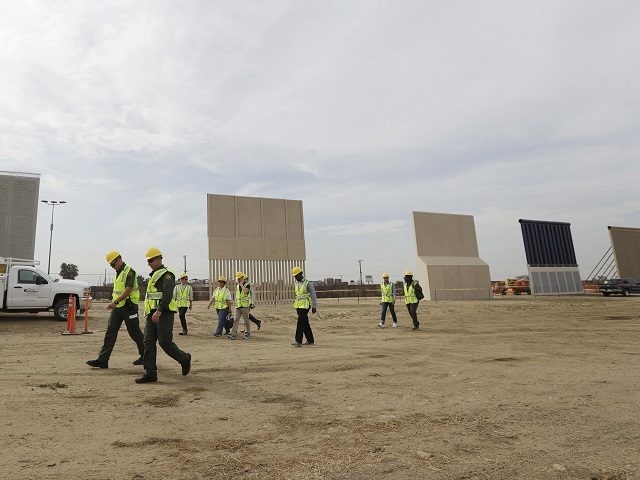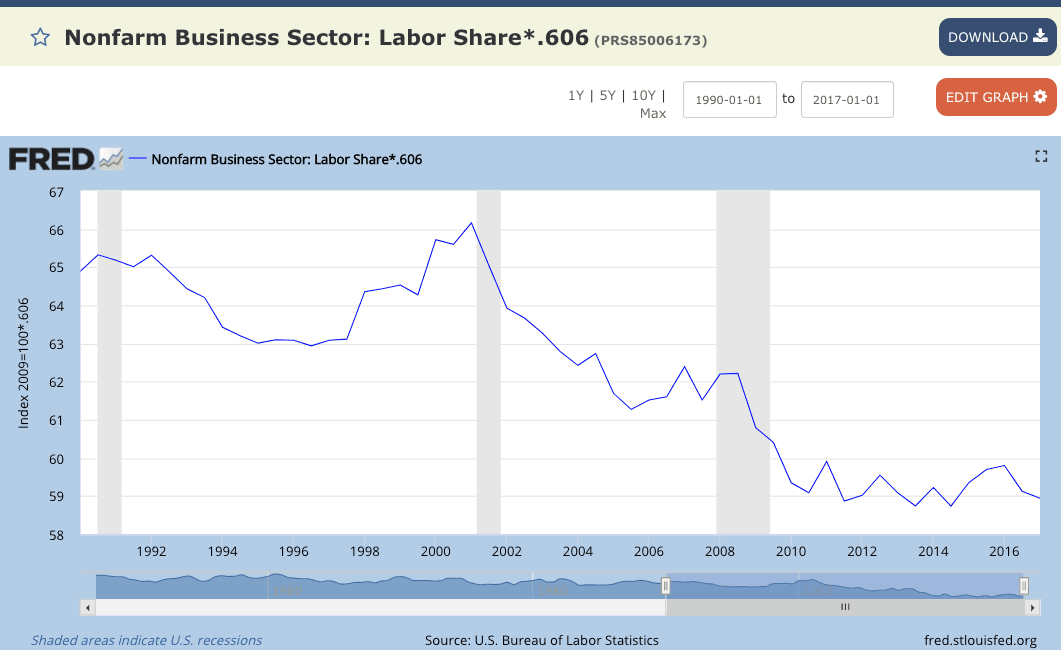Two pro-amnesty Democratic leaders have grudgingly accepted President Donald Trump’s call for a border wall, yet pro-Democratic media reporters are still insisting that Trump doesn’t know what he wants and can’t negotiate a deal anyway.
“In exchange for strong DACA protections, I reluctantly put the border wall on the table for discussion,’ Schumer said on the Senate floor as he tried to blame Trump for the Democrats’ near-unanimous Friday-night move to block a procedural vote, so preventing the GOP from passing the government budget with 51 votes.
Retiring Democratic Rep. Luis Gutierrez angrily declared “We’ll build him a wall. Tell us how high you want it. But free the Dreamers.’
The ‘dreamers’ term refers to the population of roughly 3.25 million young illegal immigrants that Democrats have put ahead of the federal budget for 310 million Americans.
Despite these two partial victories — and despite evidence of division and duplicitousness among Democrats who have blocked the government budget to win unpopular favors for illegal immigrants — major media outlets are declaring that Trump can’t negotiate a deal.
The New York Times posted an article by Michael Shear and Maggie Haberman, saying:
President Trump and Senator Chuck Schumer of New York, the top Democrat in the Senate, came close to an agreement to avert a government shutdown over lunch on Friday. But their consensus broke down later in the day when the president and his chief of staff demanded more concessions on immigration, according to people on both sides familiar with the lunch and follow-up calls between Mr. Trump and Mr. Schumer …
As the meal progressed, an outline of an agreement was struck, according to one person familiar with the discussion: Mr. Schumer said yes to higher levels for military spending and discussed the possibility of fully funding the president’s wall on the southern border with Mexico. In exchange, the president agreed to support legalizing young immigrants who were brought to the United States as children …
Mr. Trump, a onetime real estate mogul whose book “The Art of the Deal” proclaimed his mastery of negotiation, has struggled at times to seal deals as president. He inserted himself into health care negotiations last March, only to see talks in the House collapse. In September, a deal-making dinner with “Chuck and Nancy” — Mr. Schumer and Representative Nancy Pelosi of California, the House minority leader — later devolved into angry recriminations. And he has so far failed to bring his promised trade talks to a close.
That one-source claim was denied by Trump’s budget director, Mike Mulvaney:
Saturday afternoon, White House budget chief Mick Mulvaney, in an impromptu press briefing, said Schumer’s offer to fund the wall fell well short of the money Trump has been seeking.
Mulvaney, citing Kelly, said that Schumer told Trump he would agree to “all the money for the wall,” which Trump took to mean the full $20 billion that building a partial border wall is expected to cost. But what Schumer was actually talking about was the $1.6 billion the White House had already sought in an annual appropriations bill. Mulvaney said this misunderstanding reflected Schumer’s duplicitous negotiating tactics.
“That is not ‘all of the money for the wall,’ nor was it ever intended to be all the money for the wall,” said the budget director.
Sen. Tom Cotton also scoffed at the claim:
1. There was no "deal" yesterday, last Thursday, or at "Chuck & Nancy" dinner.
2. WH has NOT withheld or shifted its position in immigration talks. Dems just don't like the position.
All just Dem spin to cover their bad-faith negotiating & extreme open-borders views.
— Tom Cotton (@TomCottonAR) January 20, 2018
Schumer’s press aide rejected Mulvaney’s explanation:
Director Mulvaney was not in the lunch, and is not telling the truth.
Period, full stop. https://t.co/n7L00LNErE
— Matt House (@mattwhouse) January 20, 2018
Schumer’s Friday lunchtime failure to persuade Trump to abandon his election promises prompted Schumer to belittle Trump as a lump of Jell-O — even though the Jell-O has now gotten Schumer to accept the principle of a wall:
Sen. Chuck Schumer: "Negotiating with this White House is like negotiating with Jell-O. It's next to impossible." https://t.co/X8cJ8wAsIt pic.twitter.com/yxHZ538YGa
— This Week (@ThisWeekABC) January 20, 2018
Despite Democrats’ finger-pointing claims amid alarming poll numbers, Trump has made his immigration policy very clear during the 2o16 campaign, in his “Buy American, Hire American” inauguration day speech, in his October 8 Immigration Principles, in the January 9 televised negotiation session and repeated time and time again in numerous Tweets.
Thank you to the great Republican Senators who showed up to our mtg on immigration reform. We must BUILD THE WALL, stop illegal immigration, end chain migration & cancel the visa lottery. The current system is unsafe & unfair to the great people of our country – time for change!
— Donald J. Trump (@realDonaldTrump) January 4, 2018
Last week, Trump rejected the “Gang of Six” amnesty-plus plan, which would have provided only $1.5 billion towards the 10-year, $33 billion cost of building and operating a border wall. The plan only offered the token funding while declaring a huge fast-track, wage-cutting, presidency-breaking amnesty for roughly 3.25 million younger illegals, plus a few million of their illegal-immigrant parents, plus 400,000 migrants with expiring “Temporary Protected Status,” plus perhaps several million future “chain migration” relatives. The plan also offered only token improvements in border-wall laws, chain-migration and the visa lottery.
The so-called bipartisan DACA deal presented yesterday to myself and a group of Republican Senators and Congressmen was a big step backwards. Wall was not properly funded, Chain & Lottery were made worse and USA would be forced to take large numbers of people from high crime…..
— Donald J. Trump (@realDonaldTrump) January 12, 2018
That one-sided verbal offer was pushed by progressive Democrats and liberal Republicans, and was championed a near-complete deal by media outlets, even though it has no support Trump’s 2016 voters.
Schumer’s new acceptance of the wall is a significant marker of progress by Trump because many Democrat activists viscerally oppose a border wall as a supposed “trophy” for Trump — but also because it is a symbolic distinction between the United States and other countries. Democratic groups and business groups also oppose the wall because it would hinder the northward flow of cheap-labor migrants to Democratic-run low-wage cities on the coasts.
The Democrats’ failure to persuade Trump to accept the “Gang of Six” amnesty-giveaway played a large role in the Democrats’ self-inflicted decision to shut down the federal government and subsequent acceptance of the principle of a border wall. One major factor was that Democrats enraged fellow Democrats by revealing the president’s closed-door, bargaining-table dismissal of African immigration-quotas with his “shithole” remark.
Amid the Democrats’ concessions and mistakes, the Washington Post‘s Ed O’Keefe and two other journalists picked up the Trump-can’t-negotiate theme:
Trump is a self-proclaimed dealmaker who has struggled to close critical deals as president — an unreliable negotiator who seems to promise one thing only to renege days, or even hours, later. He boasts of being “flexible” and has few core ideological convictions, yet often seems torn between his desire for a bipartisan “win” and the pull of the nationalist populism he ran on. In politics, he resembles at times an amateur jazz musician — moody and improvisational, but without the technical chops to hold a piece together …
“Negotiating with President Trump is like negotiating with Jell-O,” Minority Leader Charles E. Schumer (D-N.Y.) complained on the Senate floor Saturday, some 12 hours into the shutdown. “It’s next to impossible” …
“What happened to the President Trump who asked us to come up with a deal and promised that he would take heat for it?” Schumer asked on the Senate floor shortly after the government shutdown had begun at midnight. “What happened to that president? He backed off at the first sign of pressure.”
But early Saturday morning, there was no Trump to be found. He was cloistered at the White House away from public view. Another promising deal — so tantalizingly close — had somehow slipped away.
To be fair, O’Keefe and the other reporters do not seem to understand what the Democrats are demanding from Trump, nor that Democrats have made reluctant concessions on the wall. For example, the reporters apparently believe that Democrats are only trying to win amnesty for every illegal who was ever approved for former President Barack Obama’s DACA amnesty. They wrote that Trump:
hoped to be the bipartisan dealmaker who could both keep the government open and provide legislative protections for “dreamers,” the nearly 800,000 young immigrants facing deportation after Trump announced an end to Barack Obama’s Deferred Action for Childhood Arrivals (DACA) program.
But that 800,000 DACA population is roughly one-quarter of the ‘dreamer’ population, and roughly one-eighth of the people who could get a quick residency under the “Gang of Six” — not counting millions of extended-family members who could become chain-migration immigrants.
Polls show that Trump’s American-first immigration policy is very popular.
For example, a December poll of likely 2018 voters shows two-to-one voter support for Trump’s pro-American immigration policies, and a lopsided four-to-one opposition against the cheap-labor, mass-immigration, economic policy pushed by bipartisan establishment-backed D.C. interest-groups.
Business groups and Democrats tout the misleading, industry-funded “Nation of Immigrants” polls which pressure Americans to say they welcome migrants, including the roughly 670,000 ‘DACA’ illegals and the roughly 3.25 million ‘dreamer’ illegals.


COMMENTS
Please let us know if you're having issues with commenting.